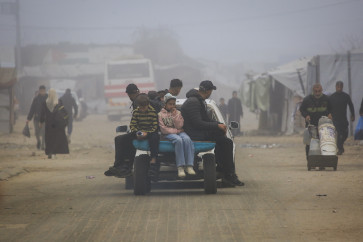Popular Reads
Top Results
Can't find what you're looking for?
View all search resultsPopular Reads
Top Results
Can't find what you're looking for?
View all search resultsShould drug addicts be jailed or rehabilitated?
The debate on whether drug users should be treated as criminals or victims has recently reemerged, especially after a TV celebrity was found unconscious in his car due to drug intoxication
Change text size
Gift Premium Articles
to Anyone
T
he debate on whether drug users should be treated as criminals or victims has recently reemerged, especially after a TV celebrity was found unconscious in his car due to drug intoxication.
Is he a drug abuser or is he a drug trafficker? Should he go to jail, to a drug rehabilitation facility, or both?
The idea of treating drug users as criminals came from the fact they use or are in possession of drugs, which by law are declared illegal. According to legal logic, anybody who uses or is in possession of illegal things, be they drugs, guns or counterfeit money, is deemed a law offender.
On the other hand, drug addiction is also considered a form of social disease, like prostitution. Not so long ago HIV was also regarded a social disease. That is why Law No. 35/2009 on narcotics and addictive drugs provides treatment and rehabilitation for drug addicts, but not for drug traffickers or dealers.
In that case, we are inclined to differentiate between those who intentionally hook other people to become addicts and those who are the victim of the former group. Here starts the idea of treating drug addicts as victims. As victims they deserve empathy, treatment and assistance to get rid of their addiction through rehabilitation.
Indeed, Law No. 35/2009 treats drug traffickers, drug addicts and drug abusers differently. However, the difference between drug addicts and drug abusers is not clear. It seems the definition of drug abuser, 'penyalah guna', refers to someone who uses drugs unlawfully without being addicted. Otherwise they will be classified as a drug addict.
This is very confusing. If individuals are not addicted, why are they using unlawful drugs? As for the punishment, every drug addict or drug abuser can be imprisoned and can attend rehabilitation. Only underage drug addicts/users will be exempted from jail and just sent to a rehabilitation facility.
Even though the law provides the possibility for the rehabilitation of drug addicts, the chapters on punishment do not explain who is going to be sent to rehabilitation and who is going to be punished with imprisonment. Everybody, whether the individual is a drug user or drug addict, is given prison time. So drug addicts can be punished by imprisonment as well as being sent to the rehabilitation facility.
It is unclear whether this rehabilitation period is also considered part of jail punishment or is a separate form of punishment. In other words, drug addicts are also considered criminals, not just victims.
Many people or governments do not support prison terms for drug addicts. The UN Commission on Narcotic Drugs, for instance, adopted a resolution that recommends the treatment, rehabilitation and social reintegration of drug addicts as an alternative to imprisonment. It also recommends efforts to prevent death from overdoses.
Yury Fedotov, executive director of the UN Office on Drugs and Crime (UNODC), emphasized the prioritization of the health agenda, stating: 'At present, the balance between our work on the supply and demand sides stays firmly in favor of the supply side. We must restore the balance. Prevention, treatment, rehabilitation, reintegration and health have to be recognized as key elements in our strategy.' This recent emphasis on health is welcomed, because discussions on drug policy are too often dominated by criminal justice arguments and polarized opinions on how to solve the so called 'war on drugs', like what is currently happening in Indonesia.
However, we must also keep in mind that rehabilitation consisting of medical and social rehabilitation as stipulated by Law No. 35/2009 will be free from adverse treatment. There is no implementing regulation on how rehabilitation facilities should be managed and controlled.
Human rights abuses can happen without public knowledge, as in the case of Vietnam as reported by the US-based Human Rights Watch. Drug addicts who are detained in rehabilitation centers in the country are often forced to work with little or no pay and those refusing to work are beaten with electric batons.
The writer is chairman of the Indonesian Public Health Scholars Association (IAKMI). The views expressed are his own.










